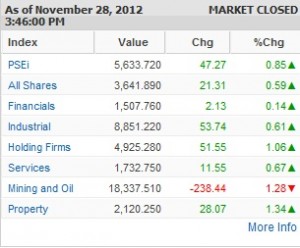PH stocks surge to all-time highs

The PSEi climbed 47.27 points, or 0.85 percent, to mark its best ever finish at 5,633.72. A new intra-day peak of 5,636.33 was likewise recorded.
Because of the stellar economic growth in the first three quarters of the year and given the still rosy prospects until yearend, Metrobank’s research team has upgraded its full-year GDP growth forecast for this year to 6.6 percent from 5.5 percent.
“On the demand side, household consumption will remain as the growth driver. Consumer spending will still be supported by the sustained inflow of remittances and the still well-anchored inflation expectations,” Metrobank said.
On the supply side, Metrobank said the services sector would be supported by the rosy outlook for the real estate and tourism sub-sectors.
Public construction is expected to sustain its growth in the second half of the year on accelerated government spending ahead of the congressional elections next year while the agriculture sector is also seen to sustain its rebound given that no adverse weather condition was experienced in the last months of the year.
But the next question is how this robust growth would affect monetary policy. The Bangko Sentral ng Pilipinas (BSP) has so far slashed its key interest rates by 100 basis points this year but mostly due to concerns over a sharply appreciating peso rather than growth.
One out of 10 households in the country is supported by remittances from relatives overseas. The peso value of these remittances shrinks whenever the local currency is appreciating. Exporters who earn in foreign currency are also affected by a strong peso.
Monetary easing seen
JP Morgan, in a research report on Wednesday, said the strong growth reduced but did not eliminate potential for monetary easing.
“Domestic demand has been strong in the Philippines. This strength has reflected a low interest-rate environment, combined with strong remittance inflows and steady government consumption this year (spending has been slower this year than planned but is still stronger than last year). Moreover, the government has been pushing investment via private-public partnerships (PPPs), which though slow, are starting to get off the ground,” JP Morgan said in its research.
JP Morgan noted that while an important signal, the PPPs themselves may have a small direct effect on growth, likely around 0.5 percent of GDP on average until 2020.
Fastest expansion
HSBC economist Trinh Nguyen said that in contrast to the region, which experienced slowing growth in the third quarter, the Philippines saw the fastest economic expansion this year.
“Exports of both goods and services, private and public consumption, and investment soared despite the global slump. This reflects both timely policy actions by the BSP and the government as well as the resilient nature of the consumption-driven economy. With such a strong performance, the BSP will hold rates when it meets in December,” Nguyen said.
On the whole, economic growth was broad-based, which means “most of the economy’s engines are humming stronger,” said Jose Mari Lacson, head of research of Campos, Lanuza & Co.
“Most notable, however, was the tag team of private and public construction, which drove industrial production higher. While manufacturing sustained its improvement, we do note a deceleration in services growth. And the services slowdown was across the sub-sector, meaning even retail and wholesale trade demand may have started to plateau—a possible repercussion of the stronger peso. The bottomline, however, is that the recovery in agriculture and stronger industrial production had more than offset the slowdown in services and reduced purchasing power of overseas remittances in the third quarter of 2012,” Lacson said.
